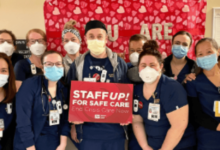Nursing staff suffering panic attacks and stress-related issues

Almost a third of NHS staff have had to take time off work due to poor mental health in the past year, a new union survey has suggested, as the vast majority said better pay, staffing and support would help their wellbeing.
Unison, which represents nursing staff and other healthcare workers across the UK, has published the results of a new survey of more than 12,000 NHS staff.
“The level of stress affects my home life as it causes worry and brain fog”
Nurse in Unison survey
The survey aimed to investigate the scale and impact of mental health issues on the NHS workforce.
Of the survey respondents, 31% said they had to take time off work with mental health issues in the last 12 months.
Around one in five (20%) of these workers did not tell their employers the real reason for their absence, the survey found.
Of those who kept the reason secret, 45% said it was because they did not think their employer would be supportive, and 22% said it was because they did not want colleagues to know they had mental health issues.
Latest official data from NHS Digital showed that a quarter (25%) of staff sickness absences in England in October 2023 were recorded as being due to mental health reasons.
Health staff told Unison they suffered panic attacks, depression, low mood, sleepless nights, flashbacks, high blood pressure, chest pains and headaches due to mental health issues.
The union said the survey showed “the effects of burnout” on healthcare staff, many of whom are considering quitting for lower-pressured jobs.
A nursing associate from the East of England told the survey: “I’ve been getting panic attacks, anxiety and started having blood pressure problems.”
Similarly, one Northern Irish nurse added: “I’ve been experiencing stress-related symptoms, headaches, heart palpitations and chest pain.
“The level of stress affects my home life as it causes worry and brain fog.”
Most NHS workers told the survey they were not able to ask their employer for help with mental health in the last 18 months.
For those who were, around half (48%) said they did not feel supported when they sought help.

Helga Pile
Unison head of health Helga Pile described the workforce as at its “limit”, and called for improvements to the pressure on staff.
“Burnout is a reality in every part of the health service, from hospital wards to ambulance stations,” said Ms Pile.
“As more staff quit, the pressures increase for those still working in the NHS, and many are struggling to cope.
“No one should suffer stress-related issues such as panic attacks and chest pains because of their job.
“Employers must do more to recognise the overwhelming pressures on all NHS staff including healthcare assistants, cleaners and paramedics.”
She said that, specifically, support for people seeking help with mental health issues must be “reviewed” and reiterated her union’s calls for safer staffing and breaks for workers.
Unison’s survey was published ahead of the union’s national health conference, being held in Brighton this week.
There, healthcare workers will discuss topics including pay, staffing, working hours, racism in the health service and improvements to pay banding for healthcare assistants, among others.
The union said that artificial intelligence and support for healthcare students will also be debated.







